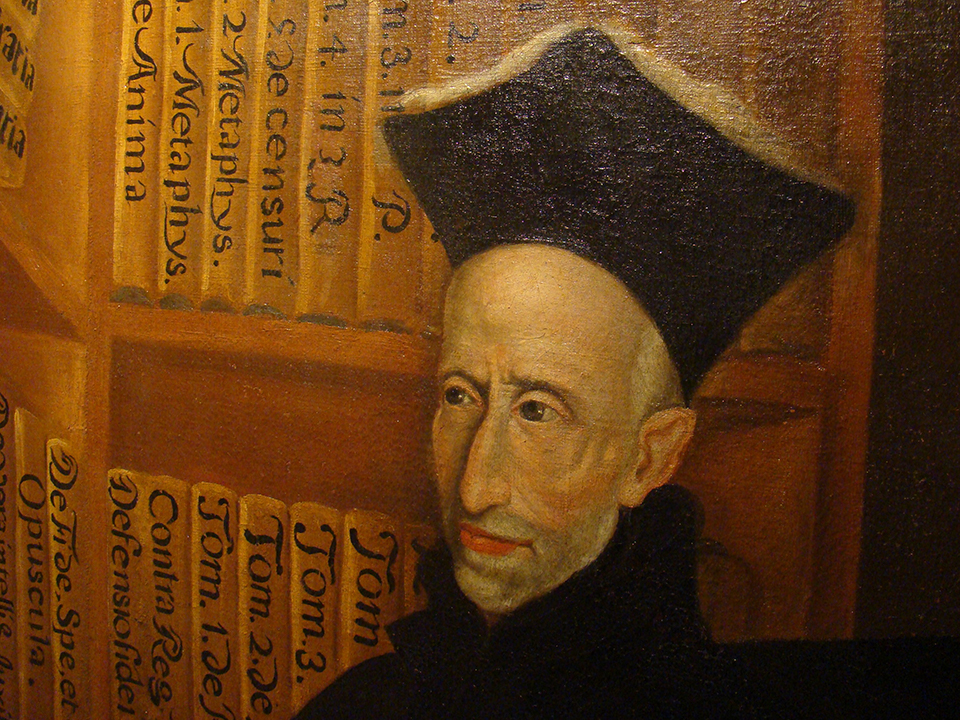Making the Modern Modern: Digitizing Francisco Suárez, SJ
How can you properly study an author whose collected works have not been reprinted in nearly a century and a half?
Digitize them.
What if they comprise 28 oversize volumes?
Digitize them. All of them. The two volumes of indexes included.
In 2011, the Boston College Libraries Digital Library Programs did just that for the “opera omnia” of the Spanish Jesuit philosopher and theologian Francisco Suárez (1548–1617), which were last published in Paris between 1856 and 1878.
When Robert Maryks, an associate director of the Institute for Advanced Jesuit Studies and editor-in-chief of the Journal of Jesuit Studies, arrived at Boston College in 2013, he took note of this achievement and encouraged the Libraries to also digitize earlier printings of Suárez’s works so that their editorial history could be critically examined. With the 400th anniversary of Suárez’s death approaching in 2017, and an accompanying resurgence of interest in a thinker who pivoted medieval Scholasticism toward modern concepts of the individual and society, Maryks contended that Boston College could contribute much to contemporary scholars’ investigations of Suárez by making the older editions of his works more accessible, digitally.

Burns Library holds the most extensive collection of Jesuit philosophical and theological works in North America, so it could provide a ready supply of rare, early copies of Suárez’s works for the project.
A prospective list of 49 titles in 121 volumes was generated by Head of Digital Library Programs Betsy Post in May 2014. Maryks reviewed and approved the list, and the scanning soon began. About half of the volumes, the sturdier ones, were sent to Internet Archive scanning team at Boston Public Library. Over the years, the Libraries have contracted with the team to scan thousands of books.
Some of the Suárez volumes were too bulky or too fragile, and so were scanned by Libraries’ staff on the Atiz scanning station in Burns Library. The Atiz has a pair of Canon EOS 5D Mark II cameras that capture double-page openings at 375 pixels per inch. Digital Content Specialist Cheryl Ostrowski logged 384 hours capturing a total of 45,682 pages from 63 volumes—an impressive rate of 119 pages per hour. Imaging Assistant Naomi Rubin managed a group of nine students who devoted another 802 hours to “post-processing”—straightening and cropping images to correct alignment issues caused by the special propping needed to gently open the antique bindings for scanning.
Several other Libraries’ staff contributed their time and expertise to the project as well, in particular Digital Production Manager Bill Donovan and his successor Chris Mayo, Conservator Barbara Hebard, and Rare Book Cataloger David Richtmyer.

By August 2016, the last of the volumes had been scanned. The final tally: 44 titles in 119 volumes, all of which can be freely viewed and downloaded via the Internet Archive website as well as the HathiTrust digital library. Records in the Libraries’ own catalog contain links to the online versions as well as call numbers for the original copies, which may be consulted in the Burns Library Reading Room.
Francisco Suárez Collection on the Internet Archive
Quick stats:
- 44 titles in 119 volumes published between 1599 and 1878
- 24,745 page views as of January 1, 2017
Already, Internet Archive statistics suggest a story of scholarly use. Collectively, the 28 volumes comprising the Parisian Opera omnia edition have received more than 18,000 pages views since they went online in 2011. The more recently added volumes—all of which represent earlier editions of treatises included in the Opera omnia—have received another 6,000 page views. This last figure could indicate that some researchers are comparing the transmission of texts through successive printings.
Suárez is not an easy thinker to penetrate, yet his influence has been wide-ranging and far-reaching, leaving its marks on philosophers more commonly associated with modern thought such as Descartes and Leibniz, Locke and Heidegger. For historians of Jesuit intellectual culture like Maryks, Suárez embodies elements of “Jesuit distinctiveness,” which make him all the more interesting to scholars today whose inherently interdisciplinary approaches bring sociological concerns to textual analysis. Providing digital access to a comprehensive corpus of Suárez’s works in their various editions can render such investigations more practical and more fruitful.
To commemorate the 400th anniversary of Suárez’s death and bring renewed attention to his legacy, the Institute for Advanced Jesuit Studies is co-organizing a symposium on Suárez and early modern Jesuit philosophy in Seville, Spain, in 2018.